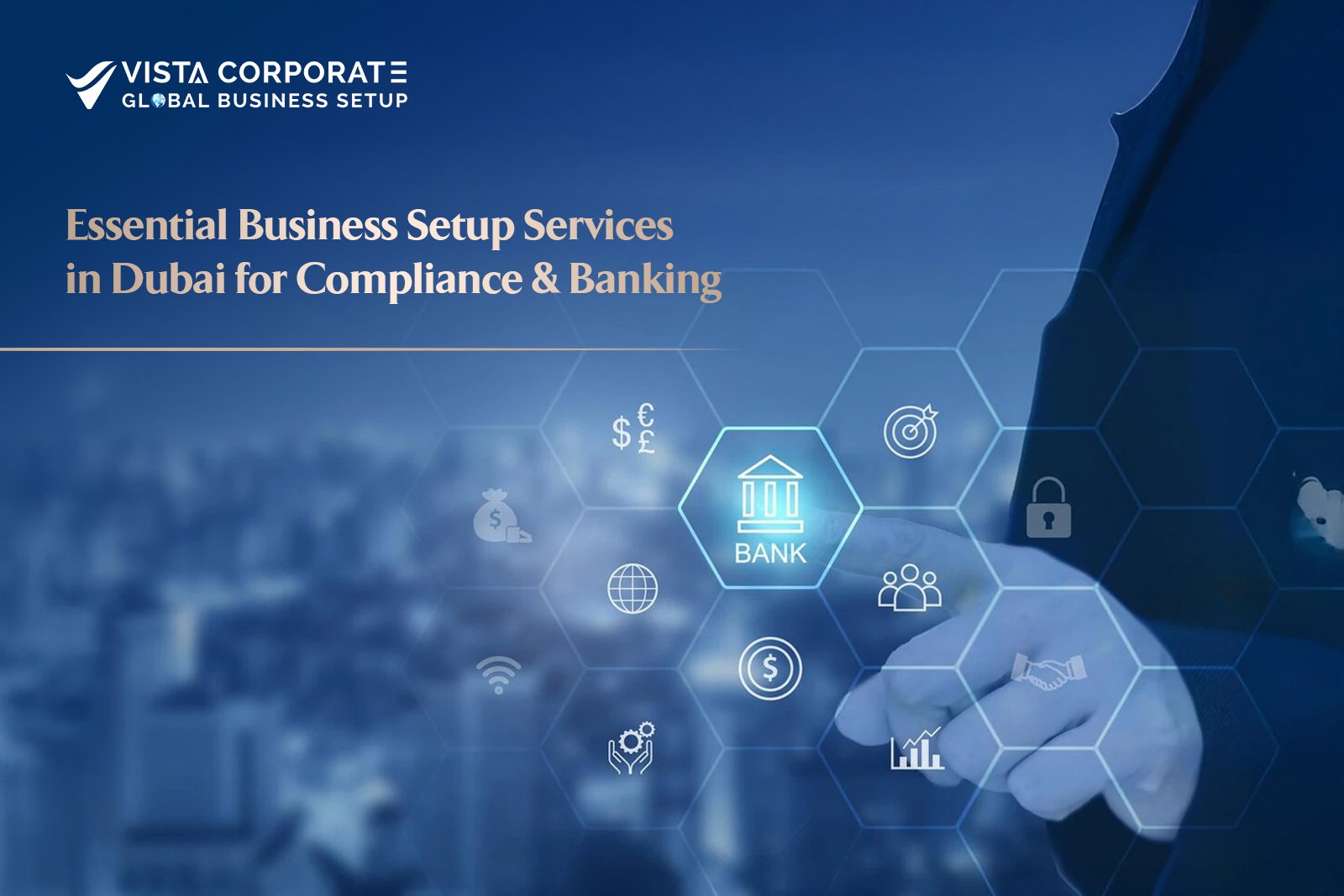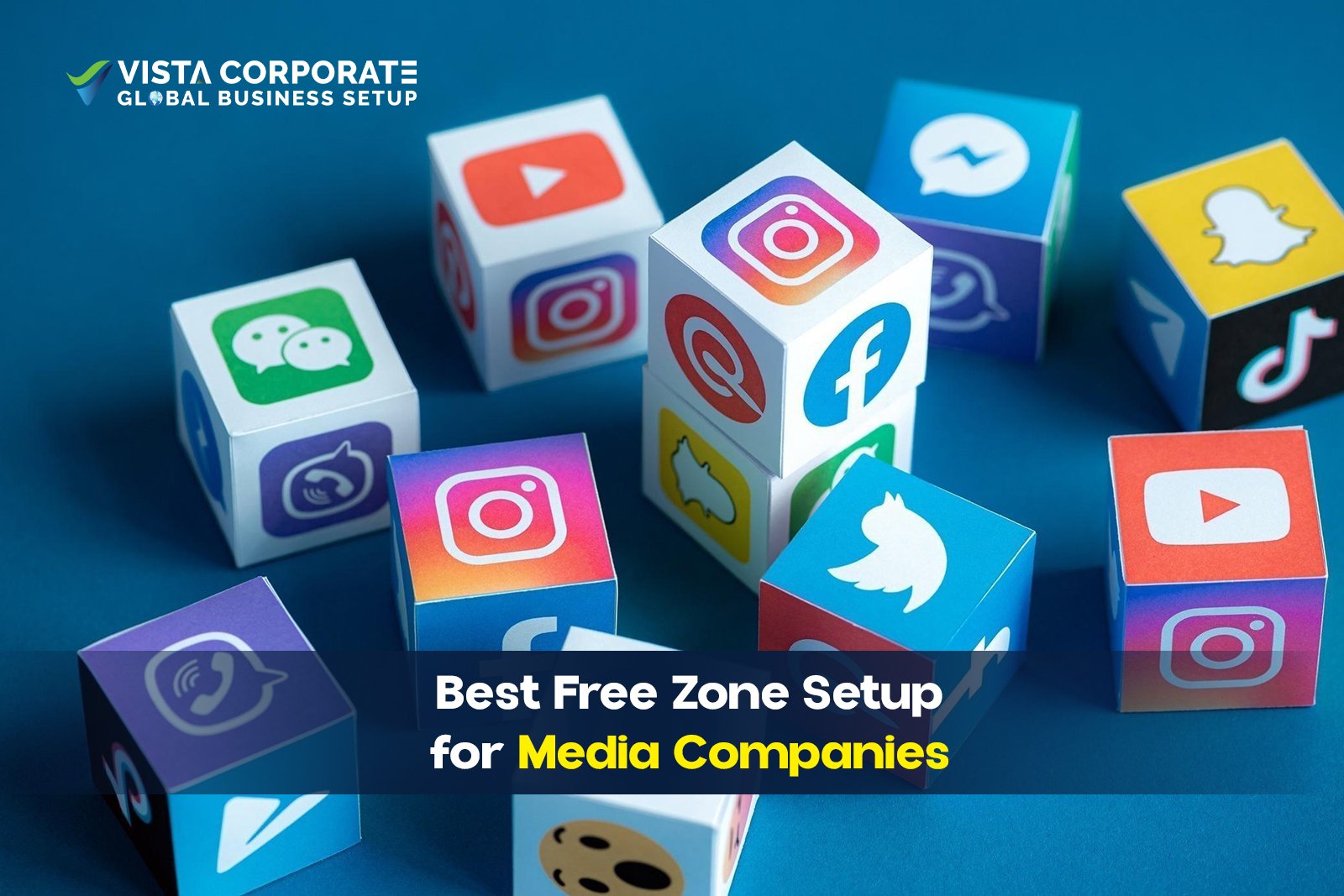
Overview of Business Setup in Dubai
Starting a business in Dubai means navigating both regulatory compliance and banking requirements in a single, integrated process. Dubai offers two main jurisdictions: the Mainland, governed by the Department of Economic Development (DED) and Ministry of Economy, and multiple Free Zones like DMCC, JAFZA, and DIFC, each with its own authority. Understanding the differences helps you choose the right path and avoid delays.
On the compliance side, you must obtain and maintain a trade license, secure approvals from economic or free zone authorities, and meet AML/KYC mandates. Simultaneously, setting up a corporate bank account involves selecting a bank—local or international—submitting a suite of documents, and satisfying each bank’s risk and compliance checks.
An integrated approach aligns licensing, documentation, and banking steps in parallel, reducing redundant paperwork and speeding up the overall timeline. For example, a clear timeline can show when to submit your Memorandum of Association to the DED, while simultaneously preparing bank account forms and board resolutions. By combining these tasks, you ensure a seamless journey from application to operation, minimize repeated visits to government service centers, and accelerate your time to market.
Whether you’re registering in a free zone with 100% foreign ownership or on the mainland with local sponsorship, Dubai’s business ecosystem rewards well-prepared founders who tackle compliance and banking together.
2. Regulatory Compliance Requirements
Navigating Dubai’s regulatory landscape starts with securing the right trade license. There are three main types: Commercial for trading activities, Professional for service providers, and Industrial for manufacturing. You apply through the Department of Economic Development (DED) on the mainland or via the respective Free Zone authority. Each authority has its own portal, fee schedule, and document list, but the core requirements typically include your Memorandum and Articles of Association, shareholder passports, office lease agreement, and Dubai-based manager details.
Beyond the initial license, you must obtain approvals from the Economic Department (for sectors like food, healthcare, education) and sometimes the Ministry of Economy for specific professional activities. These approvals ensure compliance with sectoral regulations, quality standards, and safety guidelines.
Anti–Money Laundering (AML) and Know Your Customer (KYC) rules are enforced across government entities and banks. You’ll need to submit detailed ownership structures, beneficial owner declarations, and bank reference letters. Maintaining compliance means regular internal audits, record-keeping for financial transactions, and ad-hoc filings with authorities if your business structure changes.
Ongoing compliance obligations include annual license renewals, updated lease agreements, and visa quota adjustments. You might also face periodic audits or spot checks by authorities. Engaging a professional compliance service can help you track renewal deadlines, submit accurate applications, and avoid fines or business suspension.
3. Step-by-Step Compliance Roadmap
A clear roadmap keeps your company formation on track and ensures no compliance step is missed. Below is a sequential guide covering document prep, submission, approvals, and ongoing obligations.
Initial Document Preparation
Gather all required paperwork before you begin applications. Core items include
- Passport copies for shareholders and managers
- No Objection Certificate (NOC) from local sponsor (if applicable)
- Memorandum and Articles of Association drafted by a legal advisor
- Lease agreement for your office or Flexi-desk
- Board resolution authorizing license and account setup
Having these documents ready avoids back-and-forth delays and re-submissions.
Application Submission Process
Submit your trade license application through the DED or Free Zone portal. You will:
- Fill out corporate details and activity codes
- Upload the prepared documents
- Pay initial licensing fees
After submission, authorities review your application within 2–3 business days. Keep track through online dashboards.
Government Fee Payments and Timelines
Different authorities charge varying fees for license issuance, name reservation, and initial approvals. Typical timelines:
- Name reservation: 1–2 days
- Initial approval: 2–3 days
- License issuance: 5–7 days after lease submission
Pay fees promptly to prevent processing delays.
Document Attestation and Translation Services
Certain documents (e.g., lease agreements, MOA) require attestation by the UAE Ministry of Foreign Affairs or embassy. Translation to Arabic may also be mandatory. Use reputed legal or PRO firms to handle this efficiently.
PRO Services for Visa and Employee Sponsorship
Once your license is issued, apply for your visa quota and work permits through a PRO service provider. They coordinate medical tests, Emirates ID registration, and labor card issuance. Outsourcing PRO tasks ensures smoother follow-up with multiple government entities.
4. Banking Setup Fundamentals
Choosing and opening the right bank account in Dubai is as crucial as obtaining your trade license. Start by deciding between a local bank (e.g., ADCB, Emirates NBD) and an international bank (e.g., HSBC, Citibank). Local banks often provide tailored SME packages, while global banks may offer seamless international transfers and multicurrency services.
Next, determine the account type you need. A corporate account is most common for trading and service companies, allowing multiple signatories and payroll processing. Some founders also open a personal account linked to the business for smaller transactions. If you deal with cross-border clients, a multi-currency account or foreign currency sub-accounts can help avoid conversion fees.
Dubai’s financial sector has embraced fintech, so consider digital banking options and virtual accounts. Banks like LIV. by Emirates NBD or Seekr offer fully online onboarding and quick preliminary approvals. Virtual account providers allow you to receive and pay funds globally without a full corporate account—ideal for startups awaiting final license issuance.
Each bank has its own risk and compliance checks. Be prepared for in-depth interviews on your business model, cash flow projections, and ownership structure. Banks will request board resolutions, certified MOA, and proof of business activities. To streamline the process, work with a specialized banking consultant who can advise on the best bank based on your corporate profile, expected transaction volumes, and industry sector.
5. Document Checklist for Bank Account Opening
When opening a corporate bank account in Dubai, having a comprehensive set of documents ready is vital to avoid repeated visits and delays. Below is a detailed checklist covering both mainland and free zone requirements.
- Company Incorporation Documents
- Certified Memorandum and Articles of Association
- Trade license copy (initial or renewed)
- Certificate of Incorporation or Registration
- Board resolution authorizing account opening
- Certified Memorandum and Articles of Association
- Shareholder and Director Identification
- Passport copies of all shareholders, directors, and signatories
- UAE residence visas (if available) or entry permits
- Emirates ID copies (for residents)
- Passport copies of all shareholders, directors, and signatories
- Address Proof
- Utility bill or tenancy contract (for company’s registered address)
- Director/shareholder proof of address (not older than three months)
- Utility bill or tenancy contract (for company’s registered address)
- Additional Compliance Documents
- Beneficial owner declaration form detailing ultimate shareholders
- KYC forms provided by the bank, duly filled and signed
- Bank reference letter from existing banking relationship
- Beneficial owner declaration form detailing ultimate shareholders
- Financial and Business Activity Information
- Business plan or summary of operations and revenue projections
- Audited financial statements (for established businesses)
- Proof of expected transactional volume and source of funds
- Business plan or summary of operations and revenue projections
- Free Zone–Specific Documents
- Free Zone license and lease agreement
- Certificate of Good Standing (if renewing an account)
- Free Zone license and lease agreement
- Optional Documents for Faster Processing
- Trade references from suppliers or clients
- Credit report (international or local)
- Trade references from suppliers or clients
Ensure each document is certified or attested as required. Submit legible, clear scans or notarized copies. Having this checklist prepared streamlines the bank’s compliance review and accelerates your account activation.
6. Comparing Mainland vs Free Zone Services
When choosing between Mainland and Free Zone jurisdictions, understanding service differences for compliance and banking helps you pick the best fit.
| Feature | Mainland | Free Zone |
| Ownership | Requires local sponsor or partner | 100% foreign ownership |
| Licensing Authority | Department of Economic Development (DED) | Individual free zone authority (e.g., DMCC) |
| Compliance Approvals | DED, Economic Department, Ministry of Economy | Single free zone entity handles all approvals |
| Office Requirements | Physical office mandatory | Flexi-desk or virtual office options available |
| Banking Access | Broad access to local and international banks | Some banks require additional free zone approvals |
| Account Setup Timeline | 4–6 weeks | 2–4 weeks |
| Visa Quota | Higher visa allocation | Limited quota based on package |
| Renewal Process | License and visa renewals via DED portal | Renewals via free zone online system |
Pros and Cons
- Mainland Pros: Greater market access; unlimited trading outside UAE; robust banking network.
- Mainland Cons: Local sponsor requirement; higher office space commitments.
- Free Zone Pros: Full foreign ownership; simplified approvals; lower office footprint.
- Free Zone Cons: Restricted to zone activities; possible bank restrictions on free zone licenses.
Key Takeaway:
Mainland setups suit businesses targeting the UAE market directly, while free zones are ideal for export-focused, service, or holding companies seeking full ownership and faster approvals.
7. Top Service Providers for Compliance & Banking
Partnering with the right service providers ensures a smooth and compliant business setup experience. Below are key categories of providers specializing in compliance and banking services in Dubai.
Specialist Compliance Firms
These firms handle trade license processing, document attestation, and government approvals. Examples include:
- VistaCorp: Offers tailored compliance packages covering mainland and free zone setup, PRO services, and visa processing.
- Virtuzone: Known for fast licensing and strong aftercare support to maintain compliance and renewals.
- Shuraa Business Setup: Focuses on end-to-end licensing and economic department approvals with a strong local presence.
Banking Consultants and Corporate Banks
Consultants bridge the gap between government licensing and banking approvals by helping clients prepare bank-grade documents and advising on bank selection. Notable players:
- TMG Business Consultants: Provide banking account opening facilitation with personalized bank recommendations.
- HSBC UAE and Emirates NBD: Leading banks offering SME-specific account packages with integrated compliance support.
Combined Package Providers
Some firms bundle compliance and banking services for one-stop convenience:
- DhanGuard: Offers full-spectrum company formation with integrated banking and compliance advisory.
- Radiant Business Setup: Provides customized service packages with dedicated banking liaison support.
Comparison Matrix of Offerings
| Provider | Compliance Services | Banking Facilitation | PRO Services | Free Zone Support | Mainland Support |
| VistaCorp | License application, renewals, audits | Bank account assistance | Visa, immigration | DMCC, Jebel Ali | DED, Economic Dept. |
| Virtuzone | Licensing, visa quota management | Digital banking consultation | Document attestation | DIFC, SHAMS | Mainland |
| Shuraa | Trade licenses, approvals | Banking liaison service | Immigration, PRO | Free zones | Mainland |
| TMG | Compliance & audit advisory | Corporate account setup | PRO services | Free zones | Mainland |
| Radiant Setup | Business licensing and compliance | Bank introductions | Visa & immigration | Free zones | Mainland |
Working with specialized firms reduces errors, speeds approvals, and grants access to vetted banking partners. Select a provider that fits your business type, location, and scale for the best results.
8. Case Study: Smooth Setup in DMCC
Setting up a business in the Dubai Multi Commodities Centre (DMCC) free zone illustrates how a well-planned approach to compliance and banking streamlines the entire process. DMCC is one of the most popular free zones in Dubai, known for its flexible ownership policies, world-class infrastructure, and fast approvals.
In this case, an international trading company sought to establish a DMCC entity for commodity trading with full foreign ownership. The company engaged a specialized compliance service provider to manage trade license application, document attestation, and regulatory approvals, while simultaneously preparing the necessary documents for banking setup.
The process began with gathering essential documents, including the Memorandum of Association, passport copies, and a lease agreement for a Flexi-desk office, as required by DMCC. A PRO team submitted the trade license application online, securing initial approval within two business days. Parallelly, the banking consultant liaised with local banks to identify the best fit based on the client’s business model.
Banking setup included submitting certified corporate documents, shareholder KYC forms, and a business plan outlining expected transactions. The proactive compliance team ensured AML/KYC criteria were met ahead of time, reducing back-and-forth with the bank’s compliance officers. The corporate account was approved and activated within four weeks.
Key lessons from this DMCC setup:
- Engage trusted service providers early to handle simultaneous compliance and banking processes.
- Prepare all documents meticulously to adhere to both free zone and banking requirements.
- Begin banking discussions alongside licensing to prevent delays post-license issuance.
This case demonstrates the advantage of a synchronized approach combining compliance approvals and banking setup in Dubai’s regulatory landscape. It leads to faster company activation, operational efficiency, and effective risk management.
9. Interactive Assets and Tools
To simplify complex steps and improve user experience, interactive assets and tools offer practical support during business setup in Dubai. These resources help entrepreneurs track progress, understand requirements, and make informed decisions about compliance and banking.
Downloadable Compliance Checklist
A detailed checklist covering every regulatory step ensures no documents or approvals are missed. It includes trade license application, approvals from economic departments, document attestation, visa quotas, and renewal dates. Users can download and customize based on their jurisdiction (mainland or free zone).
Setup Process Flowchart
A visual flowchart breaks down the company formation journey into distinct stages. From name registration and license application to bank account setup and visa processing, each step is clearly laid out with estimated timelines. This tool helps entrepreneurs visualize their path and identify bottlenecks early.
Decision Tree for Bank Selection
Choosing the right bank requires evaluating factors like business type, expected transaction volumes, multicurrency needs, and digital banking preferences. An interactive decision tree guides users through a series of questions to identify banks that align with their profile. It then links to expert articles and consultant contacts for personalized advice.
Interactive FAQ Board
An online board where users can input their questions and find answers instantly, organized by topic (compliance, licensing, banking, visas). It includes links to regulatory updates and contact details for government departments.
Leveraging these interactive assets empowers business owners to navigate Dubai’s compliance and banking landscape with confidence and transparency. Providing such user-centric tools distinguishes service providers and enhances customer satisfaction.
When setting up a business in Dubai, certain pitfalls can cause delays or regulatory issues if overlooked. Being aware of these and taking preventive measures ensures a smoother setup.
Pitfall 1: Incomplete Documentation
- Submitting partial or outdated documents leads to rejections and delays.
- Always use certified, attested, and current copies of passports, MOA, and lease agreements.
- Engage PROs or legal consultants to audit your paperwork before submission.
Pitfall 2: Ignoring AML/KYC Mandates
- Underestimating the depth of Anti-Money Laundering (AML) and Know Your Customer (KYC) requirements can result in banking denials or license suspensions.
- Prepare comprehensive beneficial ownership declarations and maintain accurate financial records.
- Regularly update your compliance status and stay informed on evolving regulations.
Pitfall 3: Choosing the Wrong Banking Partner
- Selecting a bank without considering your industry or expected transaction size can cause account closures or service limitations.
- Research multiple banks, their packages, and digital banking facilities.
- Use banking consultants to align bank choice with business goals.
Pitfall 4: Delayed Visa and Employee Quota Arrangements
- Waiting until after business license issuance to start visa processing slows staff onboarding.
- Plan visa quotas simultaneously with license setup to ensure readiness on launch day.
- Utilize PRO services to handle medical, ID registration, and labor card formalities efficiently.
Pitfall 5: Overlooking Renewal Deadlines
- Missing license or visa renewal dates triggers fines or business interruptions.
- Use calendar reminders and compliance management software to track deadlines.
- Consider service providers offering annual renewal packages to avoid lapses.
By anticipating these common issues and actively managing your business setup timeline, you can avoid costly setbacks and launch operations on schedule.
Next Section: WRITE H2: 11. Timeline and Milestones## H2: 11. Timeline and Milestones
Understanding the typical timeline and key milestones for business setup in Dubai helps you plan effectively and set realistic expectations for compliance and banking approvals. While timelines vary based on jurisdiction, business activity, and document readiness, below is a general roadmap.
Week 1–2: Pre-Application Preparation
- Finalize company structure and shareholder details.
- Draft and attest key documents like Memorandum of Association and lease agreements.
- Submit trade name reservation and initial approval applications through DED or free zone portals.
Week 3: Licensing and Compliance Approvals
- Receive initial application approvals.
- Pay licensing fees and complete license issuance.
- Obtain specific economic department or sectoral approvals if applicable.
Week 4: Banking Setup and Document Submission
- Select bank and submit corporate account opening documents.
- Prepare for and complete bank interviews or compliance meetings.
- Receive bank approval or conditions for account activation.
Week 5–6: Visa Quotas and PRO Services
- Apply for visa quota allocation based on license type.
- Begin visa processing, including medical testing and Emirates ID applications for employees.
- Complete labor card and residency visa issuance.
Key Milestones to Track
| Milestone | Expected Duration | Notes |
| Trade Name Reservation | 1–2 days | Start of formal process |
| Initial Approval | 2–3 days | Depends on activity and zone |
| License Issuance | 3–7 days | Lease and document attestation required |
| Bank Account Approval | 2–4 weeks | Varies by bank and documentation |
| Visa Quota Approval | 1–2 weeks | Crucial for employee onboarding |
| Visa and Labor Card Issuance | 3–4 weeks | May overlap final license steps |
Having these milestones charted allows you to coordinate compliance tasks and banking setup, minimizing wait times. Early engagement with consultants and PROs enhances efficiency, especially in busy periods or complex business sectors.
12. Advanced Tips for Efficient Setup
For entrepreneurs aiming to fast-track their Dubai business setup while staying fully compliant, applying advanced strategies can make a significant difference in time and costs.
- Leverage PRO and Legal Services Together
Combining Public Relations Officer (PRO) services with legal advisory streamlines document attestations, government approvals, and visa processing. Professional providers coordinate with multiple government bodies simultaneously, avoiding duplicated trips and paperwork errors. - Negotiate Bank Fees and Services Early
Banks may offer negotiation opportunities on fee structures, minimum balance requirements, and account features, especially for startups with growth potential. Engage banking consultants who understand industry-specific banking packages to secure tailored terms that match your business model. - Utilize Fintech Platforms for Interim Banking
While waiting for full corporate account approval, fintech alternatives such as digital wallets or virtual accounts enable you to start business operations smoothly. These platforms offer fast onboarding, multicurrency acceptance, and global payment capabilities to bridge the gap during setup delays. - Maintain Regular Compliance Updates
Set up a compliance calendar with renewal reminders, audit schedules, and regulatory updates. Continuous monitoring prevents lapses that could lead to fines or disruptions, particularly in fast-evolving sectors like fintech or healthcare. - Prepare Transparent Ownership Structures
Banks and regulators require clarity on beneficial owners and financial flows. Use clear organizational charts and maintain updated ownership records to reduce scrutiny, ease KYC checks, and facilitate quicker approvals. - Plan Visa and Employee Sponsorship Concurrently
Sync visa applications and labor quota submissions with license issuance timelines. This approach brings your team onboard faster and aligns business operations with human resource needs from the outset.
By integrating these tips into your setup plan, you position your Dubai business for faster launch, smooth compliance, and effective financial management.
13. Conclusion
Setting up a business in Dubai successfully requires a careful balance of regulatory compliance and banking setup. By understanding the distinct requirements of mainland and free zone jurisdictions and adopting an integrated approach, entrepreneurs can streamline approvals, reduce delays, and ensure smooth operations.
A clear comprehension of licensing types, regulatory bodies, and AML/KYC mandates—and pairing this knowledge with precise bank documentation and selection—removes common obstacles faced during setup. Partnering with specialist service providers for compliance and banking facilitation offers invaluable support, while leveraging interactive tools and advanced strategies accelerates the journey from application to operational launch.
Ultimately, a synchronized business setup roadmap, supported by expert guidance, empowers companies to focus on growth and innovation rather than administrative hurdles, making Dubai a prime destination for global commerce with confidence and regulatory certainty.
14. FAQ Section
- What documents are essential for starting a business in Dubai?
- Certified copies of shareholder and director passports
- Memorandum and Articles of Association (MOA)
- Trade license application and approval receipts
- Office lease agreement or flexi-desk contract
- Board resolution authorizing company formation and bank account opening
- Beneficial ownership declaration forms for compliance
- Certified copies of shareholder and director passports
- How long does the Dubai business setup process usually take?
- Typically, between 4 to 6 weeks from start to finish.
- Initial approvals and trade name reservation take around 1 to 3 days.
- License issuance can take 5 to 7 days after document submission.
- Bank account setup often requires 2 to 4 weeks, depending on the bank’s process.
- Typically, between 4 to 6 weeks from start to finish.
- Is a local partner needed for mainland business setup?
- Yes, usually a UAE national sponsor owning at least 51% is required on the mainland.
- Some sectors now allow 100% foreign ownership under recent laws, but this depends on business activity and approval.
- In free zones, 100% foreign ownership is standard without a local sponsor.
- Yes, usually a UAE national sponsor owning at least 51% is required on the mainland.
- What types of business licenses exist in Dubai?
- Commercial License: For trading and buying/selling goods.
- Professional License: For service providers, consultants, and freelancers.
- Industrial License: For manufacturing and industrial activities.
- Commercial License: For trading and buying/selling goods.
- How do mainland and free zone business setups differ?
- Mainland businesses can operate across UAE markets and export freely but require a local sponsor in most cases.
- Free zone companies have 100% ownership, streamlined setup, and incentives but are limited to free zone activities and exports outside UAE.
- Mainland businesses can operate across UAE markets and export freely but require a local sponsor in most cases.
- Can I open a corporate bank account before my trade license is issued?
- Most banks require a valid trade license before opening a corporate account.
- Some fintech and virtual account providers offer temporary banking solutions pending license issuance.
- Most banks require a valid trade license before opening a corporate account.
- Why do banks sometimes reject corporate account applications?
- Missing or incomplete KYC documents.
- Unclear business activity or ownership structure.
- Lack of transparent financial history or suspicious transaction patterns.
- Missing or incomplete KYC documents.
- What impact do AML and KYC regulations have on business setup?
- Require detailed owner and beneficiary disclosures with supporting documents.
- Need ongoing monitoring of transactions and updates to compliance records.
- Banks and regulators may request additional documentation or explanations, extending setup timelines if incomplete.
- Require detailed owner and beneficiary disclosures with supporting documents.
- What are PRO services and their role?
- PRO (Public Relations Officer) handles government paperwork, document attestations, visa processing, and regulatory communications.
- They ensure timely submission of applications and follow-ups, reducing risks of delays or penalties.
- PRO (Public Relations Officer) handles government paperwork, document attestations, visa processing, and regulatory communications.
- Are there mandatory renewals after business setup in Dubai?
- Yes, annual trade license renewals with payment of fees.
- Visa renewals for owners, employees, and dependents.
- Renewal of office lease agreements to maintain valid business address.
- Yes, annual trade license renewals with payment of fees.
- What typical setup costs should be expected?
- Licensing fees depending on jurisdiction and business activity.
- Office space rental or flexi-desk leasing.
- Visa processing and employee quota fees.
- Bank account setup charges and minimum balance requirements.
- Licensing fees depending on jurisdiction and business activity.
- Can foreigners own 100% of a company in Dubai?
- Yes, in all free zones and certain mainland sectors approved under new foreign ownership regulations.
- Ownership rules vary by activity and require compliance with updated laws.
- Yes, in all free zones and certain mainland sectors approved under new foreign ownership regulations.
- What role do free zone authorities play in compliance?
- Act as one-stop licensing and regulatory authority.
- Handle license issuance, renewals, visa quotas, and regulatory compliance monitoring within their zone.
- Act as one-stop licensing and regulatory authority.
- How should I choose the best bank for my Dubai business?
- Assess banks based on business needs: transaction volume, local and international transfer capabilities.
- Consider digital banking offerings and relationship management services.
- Evaluate fees, minimum balance requirements, and customer service responsiveness.
- Assess banks based on business needs: transaction volume, local and international transfer capabilities.
- What are consequences of missing compliance deadlines?
- Fines and penalties from regulators.
- Suspension or cancellation of trade licenses.
- Restrictions or closure of bank accounts.
- Fines and penalties from regulators.
Business disruption and loss of market credibility.




